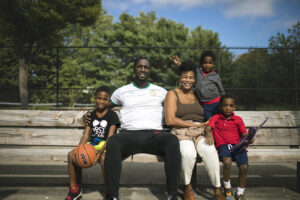Bouba | Living with LVNC-caused DCM
Boston, Massachusetts | Born October 1986
I want to show young people, or anyone else, that heart disease is not the end of the road. It’s not the end of your life.
Bouba enters the front door with arms full of to-go containers from a local West African restaurant. Before he even makes it to the kitchen, everyone in the house can already smell their favorite scents wafting in the air. It’s enough to quiet the children for a minute, who have otherwise been rather rambunctious (and hungry) since their dad stepped out to pick up lunch. Desirée puts out plates and serving utensils then stops to greet her husband, gently kissing him on the cheek, while Sembène and Sankara, their twin boys, curiously peek under the aluminum lids, excited to eat their favorite dish, deeply inhaling the enticing aromas. Buraq, their older brother, knows the smell well. It’s tieboudienne—the national dish of Senegal, where his father was born.
A meal of fish, tomato, cassava, and delicious rice all cooked together in one pot, tieboudienne is rich, hearty, and reminds Bouba of home. With a big smile, he spoons the rice, saturated with broth, onto everyone’s plates and they excitedly grab other tidbits for themselves. The other lids come off as they uncover more specialties: Attièké Poulet, a chicken dish from Côte D’Ivoire and Dibi, a grilled lamb dish from Mali. A spread such as this tends to be hard to find in some parts of the US, but fortunately, only a mile from his house in Boston, MA, a West African restaurant makes them part of a regular menu.
Without further ado, Bouba and his family head out to the porch and dig in. Like most food from his childhood, tieboudienne was most often eaten by hand, everyone at the table reaching into a single vessel to retrieve their favorite morsels. But in Bouba’s house, hands and utensils are used interchangeably, showing the seamless blend between West African and North American culture that now permeate his family’s life. Silence sets in as everyone enjoys the meal.
In truth, eating his home cuisine is truly a special treat for Bouba, who must keep a low-sodium diet. Most of his daily meals are prepared by a local non-profit that specializes in cooking for medically-sensitive diets. “I’ve learned to say no to a lot of foods,” he says. “I like simple meals. I try not to have processed foods.” Changing his diet has been one small adjustment in the battle for his health and his life—only a hint toward the grave troubles he has experienced. In many ways, these familiar flavors and textures are the return to normal that Bouba craves. Recently, he has spent much time hospitalized, dealing with complications due to his heart condition.
Bouba lives with left ventricular non-compaction cardiomyopathy (LVNC), a genetic condition of the heart, which has developed into dilated cardiomyopathy (DCM), a heart disease that puts him at high risk for potentially deadly cardiac arrhythmias and heart failure. The malformation of muscle cells due to LVNC, present since birth, has caused abnormal and enlarged growth in his heart, specifically his left ventricle. The over-pronounced muscle has less ability to effectively pump blood out the aorta to then circulate throughout the body. While Bouba has been fortunate to receive treatment, this has, in turn, altered his life’s trajectory significantly. Regardless of the setbacks and the dramatic changes, one thing has remained constant: Bouba is a man with a huge heart—literally and figuratively.
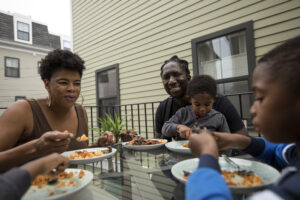
After lunch, the family heads down to the park to enjoy the perfect late-summer afternoon. Buraq excitedly runs onto the basketball court and entices Bouba to try and block him. Bouba, standing at 6’8”—a seemingly insurmountable advantage—calmly squares off against his oldest son. But just like his father, Buraq remains determined to outwit and out-maneuver his foe with focus and agility. He spins and dashes around Bouba’s waist, heading for the basket.
Witnessing his son’s enthusiasm for sports brings Bouba great joy and along with the familiar flavors of Senegalese food from earlier, foments a strong feeling of nostalgia for his youth, before the complications from cardiomyopathy. Bouba was born in Senegal and then spent much of his early years in a small village in Mali. In a country where healthcare resources are exceedingly rare, he was fortunate to have a doctor for a mother, who made sure her son got his routine check-ups. Effectively the only doctor in their small town, Bouba’s mother was gone much of the time, so she placed him in the care of trusted neighbors. With siblings and his comrades, he fostered a love of sports including swimming, soccer, basketball, and something more—a deeper bond. “We would look after each other as if we were all ‘blood brothers,’” says Bouba. “I could see a community supporting each other.”
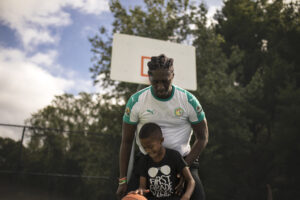
Bouba was prone to being an overachiever. In 2003, he received a prestigious scholarship and left Mali to attend university in Pretoria, South Africa. There he learned English and pursued a degree in engineering, while continuing to train and play sports. The first serious concerns about his heart were raised by university doctors who sent him to a cardiologist. “Based on my height, they misdiagnosed me with Marfan syndrome,” he says. Indeed, it soon became clear that the initial diagnosis was incorrect. “They expected my limbs to be bigger. Everyone in my family is tall. So that didn’t check out.”
Bouba graduated in 2009 and began work in the telecommunications field working as an engineer and strategist. He also continued his intense physical training regimen, and took up coaching fitness boot camps for his colleagues. In late 2012, he began struggling to keep up with his own routines and experienced what seemed like an extended flu. “I had a shortness of breath,” he recalls, “and a sharp weight on my chest. I couldn’t keep up with the guys. I thought I was unfit.”
Bouba went to the emergency room and it was there that doctors first saw the extent of the problems with his heart. X-rays and echocardiogram imaging showed that his left ventricle was overly enlarged, and he already showed signs of congestive heart failure (CHF). Based on the ECHO images, doctors diagnosed Bouba with DCM.
“The first thing I wanted to know was: what is my life expectancy and where did this come from?” There were no clear answers to either question, adding to the list of uncertainties that Bouba suddenly faced. “When I was diagnosed, I started to have these existential questions,” he recalls. “For instance: If I had five more years to live, how would I want to go? If I want people to remember me, how would I be remembered?”
Facing newly formed feelings of mortality, Bouba adjusted his mindset and lifestyle to match the risks and uncertainties of living with DCM. He continued exercising, but made sure to not stress his body too much. “I had to learn to rest, to let go, and accept help,” he says. Learning to manage chronic illness was a real challenge, but one that taught him many lessons. “Many chronic illnesses don’t get solved,” he attests. “It takes a different mindset and a different approach.” So he actively took the perspective of an engineer—someone who would develop long-term solutions to overcome his illness. “I want to show young people, or anyone else, that heart disease is not the end of the road. It’s not the end of your life.” He also came to understand that, as strong as he may be, this would not be a battle he could fight alone.
Coincidentally, Bouba had recently met a young woman, Desirée, with whom he had started a relationship. He and Des had only been dating for a year when Bouba was diagnosed. “It put a lot of pressure on our relationship,” he reflects. “It made us work harder. In hindsight, it brought us closer together.”
Their romance quickly blossomed into a family when, less than a year after his DCM diagnosis, Bouba learned that Desirée was pregnant. He proposed two weeks later, sticking to his initial plans, setting the stage for Buraq’s welcome into the world and a growing family to come. “I feel like he came as a sign,” says Bouba. “It was a difficult time. But now with Buraq, I had a reason to live. I call him my light. He was that light that came in and gave me motivation and reason. At that point, it was not about me anymore.”
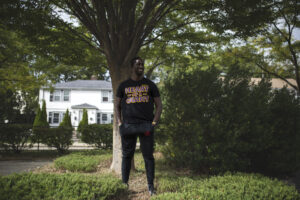
Bouba’s horizons began expanding rapidly. In 2012, social upheaval gripped Mali, resulting in terrorist attacks and a political coup. Bouba networked with friends back home and founded his first startup, a nonprofit called ViveMali in 2013 with the mission of building peace and educating young people amidst the turbulence in his home country. His involvement with the organization necessitated a move from South Africa to Dakar, Senegal in 2014. He, Desirée, and Buraq started a new life there, and Bouba continued to explore his entrepreneurial learnings. A year later, he launched Yeelen, an energy services company. In mid 2016, he was selected by the Young African Leaders Initiative (YALI), to receive a Mandela Washington Fellowship and travel to the US in order to receive several months of professional development training.
Bouba flew for over 20 hours to get to California, where he would be spending the first six-weeks of his fellowship at UC Davis’ Energy Institute. After this, he was slated to travel to Boston, where he would work with a subsidiary of General Electric.
However, the stress of the trip soon caught up with Bouba. The day after his arrival, he felt unwell. “My symptoms had come back in full force.” He fell ill, became weak, and started vomiting. He made the wise decision to go to the ER and he was quickly admitted. Bouba was suffering from CHF. The doctors took an MRI which held the key to a new diagnosis. “That’s when I learned that I have had a heart defect since birth,” he says. With the ability to see his muscle fibers more clearly, he was diagnosed with LVNC as the underlying cause of his DCM. Surgeons placed an implantable cardioverter defibrillator (ICD) into his chest. A follow-up right heart catheterization returned with alarming results. His ejection fraction stood at 11% and his cardiac output was half the normal rate—his heart was failing fast. With few other options, the doctors decided Bouba needed a heart transplant. Halfway around the world, away from his family, his home, his projects, and his community, he lay in a hospital bed alone.
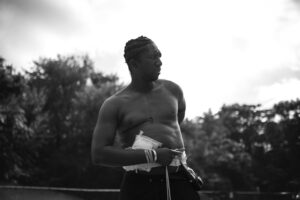
Bouba’s presence is a conversation starter. Due to his physical size alone, he looms above most, but donning a friendly smile, he never feels the least bit intimidating. However, on closer inspection it would be hard to miss the mark that DCM and LVNC have left. Jutting out from under his jersey is an angular lump, and on his hip, a large black controller with protruding wires. This is his left-ventricle assist device or LVAD, an implanted mechanical pump that helps his heart pump blood normally.
Further down his torso, on his stomach, a white dressing covers an incision where power chords run to from battery holster on his side, into his stomach, and up to his LVAD. This area requires daily and weekly maintenance—cleaning and new dressing are a must. Recent infections have sent Bouba back to the hospital, but fortunately, he’s been able to keep the worst symptoms at bay. This is one of the most serious complications of living with the device, which must remain constantly running to keep Bouba’s heart beating.
No matter how cumbersome it may be at times, the device is literally a lifesaver for Bouba. As an engineer, managing life with an LVAD—making sure his batteries remain charged and that the device is working properly—comes naturally. He remains on the transplant list, but knows that finding a suitable match will be difficult due to his physical size. “For me the real question is quality of life,” Bouba explains. “Whether I have the LVAD or the heart transplant, I want to have a good quality of life.” For now, living with an LVAD is something he can manage. “There are issues with LVAD,” he says, “but for now, it works for me… Even if or when I get a transplant, there are limitations with that as well.”
After his initial hospitalization in Sacramento, in 2016, Bouba opted to leave California, and was transferred to Boston, where he could continue to receive care post-transplant. Desirée grew up in Boston and had her family there, who would provide the community support that Bouba desired, being so far from home . Bouba underwent open-heart surgery to place the LVAD in January of 2017. His parents traveled from Africa to be with their son during what at times was a difficult recovery, although Bouba was soon back on his feet. “Three weeks after, I walked out of the hospital by myself,” says Bouba. “I have been gaining back strength since, and I am becoming more active again.”
The decision to get the LVAD implanted drastically changed the direction for Bouba, Desirée, and Buraq. Without access to specialized care in Dakar, they all moved semi-permanently to Boston. “This meant letting go of my business venture in Senegal, which was very difficult for me to do,” says Bouba.
Always one to fill his plate, Bouba quickly found new work and a new mission in Boston. Learning to manage his cardiomyopathy has allowed him to gradually return to full-time work with a binationall energy consortium headquartered in Boston. Furthermore, transformed by his new reality of living with LVNC, Bouba began learning about health education and advocacy work, speaking and educating others about his condition in person and through a blog. His writing culminated in the founding of Heart of a Giant, a US-based nonprofit which seeks to amplify patient voices to improve the outcomes for chronic heart disease patients and their support systems. “These health issues are everyone’s problems,” explains Bouba. “It’s not just doctors and nurses. All of us should have a role in it—whether it’s storytelling or sharing advice… That’s what I’m hoping to contribute to.” He hopes to be a community leader, from predominantly Black neighborhoods in Boston back, over the ocean, to Senegal and Mali.
“One of my biggest desires is to return to Africa with my family,” Bouba says. His desires are tempered by the reality of his condition. “It would have to be after a transplant.” The LVAD is supported by very few support systems worldwide, and so for now, Bouba remains in Boston, where he can get regular care and continue to manage his heart condition as best as possible.
Buraq and Bouba enter the gym wearing their robes and belt for a class in Việt Võ Đạo, or Vovinam, a popular form of Vietnamese martial arts. Boston hosts a robust Vietnamese community, which has allowed Bouba, and now his son, to partake in classes.
The teacher begins shouting commands, and Buraq and Bouba respond, kicking in unison several times, before switching legs. Beads of sweat begin to form on Bouba’s forehead and he paces himself with each move, maintaining balance and stability as his muscles slowly begin to tire. Việt Võ Đạ has proved to be an important emotional and physical release for Bouba, arduous enough to break a sweat, but not too stressful for his body. “It helps me decompress,” he says. With his very busy life, it’s no wonder that practicing martial arts has given him some important time to focus his thoughts and exercise.
Bouba looks over at Buraq as the teacher calls for a quick break. Like his father, Buraq grabs a towel to wipe the sweat from his head. He looks toward his father, who nods back with a paternal, but approving glance, nodding his head. The teacher calls attention and everyone returns to their own space to begin the next round of training. For Bouba, it is part of the cycle, of challenges, self-care, and family, that has made his life replete with love as well as challenges. “Despite living with chronic illness I’ve been able to maintain my creativity and entrepreneurial spirit,” he expresses. “I’ve been able to build new relationships. It’s been a great journey. It’s given me a will to keep on living—to just be on this side of earth.”
